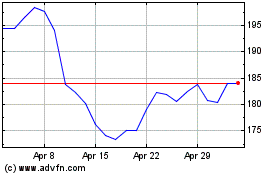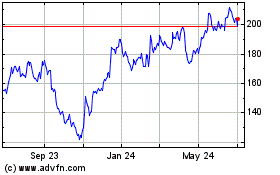New Tallest Skyscraper Planned for Tokyo
August 31 2015 - 8:40AM
Dow Jones News
TOKYO—Mitsubishi Estate Co. said Monday that it plans to build
Japan's tallest building as part of an $8.3 billion development in
central Tokyo, the latest sign of a boom in the capital's property
market.
Mitsubishi Estate said it will build a 1,279-feet skyscraper and
three other structures just north of Tokyo's main railway station,
in the heart of the city's financial hub and priciest real estate.
The targeted completion date is 2027, and the total cost will
likely top ¥ 1 trillion ($8.3 billion), with the land alone valued
at ¥ 600 billion, company officials said.
Mitsubishi Estate President Hirotaka Sugiyama said he hopes the
new development will improve the city's standing as a global
financial center, while attracting a wide range of professionals in
other industries.
"I want this building to be as symbolic and as competitive [as
other landmark buildings] in the world," Mr. Sugiyama said.
The project's long time horizon underscores Mitsubishi Estate's
commitment to the city center even as some analysts have expressed
worries about the longer-term outlook.
Tokyo's high-end property market is booming again following
years of struggle in the wake of the 2008 global financial crisis
and the March 2011 earthquake and tsunami. High-quality properties
have become nearly as expensive as during the most recent market
peak in 2007. But some fear the market will lose momentum after the
2020 Tokyo Olympics, if not sooner.
Yasuo Kono, Japan strategist at U.S.-based LaSalle Investment
Management Inc., said the recovery in office properties is
accelerating, leading to more development projects, but this
unlikely to last until 2020.
Still, projects such as the one announced by Mitsubishi Estate
fit well with the long-term redevelopment theme for Tokyo—tall,
multi-purpose buildings at the city center, and such investments
should perform relatively well, he said.
The average office vacancy rate in the central business
districts fell to 4.9% in July, down from 9.3% three years ago,
according to brokerage Miki Shoji Co. The average rent for new
buildings rose 18% during the period.
Big investors have returned. Last year, Singapore
sovereign-wealth fund GIC Pte. bought 24 floors of Pacific Century
Place Marunouchi, a building just south of Tokyo Station, for $1.7
billion.
In January, LaSalle Investment Management and sovereign-wealth
fund China Investment Corp. teamed up to buy the Meguro Gajoen
commercial property complex in Tokyo for around ¥ 140 billion ($1.2
billion).
Mitsubishi Estate's new skyscraper would be twice as tall as its
current landmark building, the Marunouchi Building just west of
Tokyo Station, and unusually high for earthquake-prone countries
like Japan. Still, it will rank well behind some of the world's
tallest buildings. The tallest building in the U.S., One World
Trade Center, is nearly 500 feet taller at 1,776 feet.
Mitsubishi Estate officials say the company's seismic-resistance
technology prevents its buildings from suffering damage or
sustained swaying during big earthquakes.
The ¥ 1 trillion price tag for the project doesn't represent the
company's coming investment. It already owns a majority stake in
the land and existing properties.
The company plans to take a majority stake in the new project.
Mr. Sugiyama said it will able to finance the project within its
regular operating budget and doesn't plan any special
financing.
Mitsubishi Estate or its group predecessors and affiliates have
been major landlords in that area of Tokyo since purchasing the
land from the government in 1890. Local real-estate professionals
say the company has never stopped redeveloping the area—even during
the worst of Japan's property market bust in the 1990s.
Write to Kosaku Narioka at kosaku.narioka@wsj.com
Subscribe to WSJ: http://online.wsj.com?mod=djnwires
(END) Dow Jones Newswires
August 31, 2015 08:25 ET (12:25 GMT)
Copyright (c) 2015 Dow Jones & Company, Inc.
Jones Lang LaSalle (NYSE:JLL)
Historical Stock Chart
From Mar 2024 to Apr 2024

Jones Lang LaSalle (NYSE:JLL)
Historical Stock Chart
From Apr 2023 to Apr 2024
